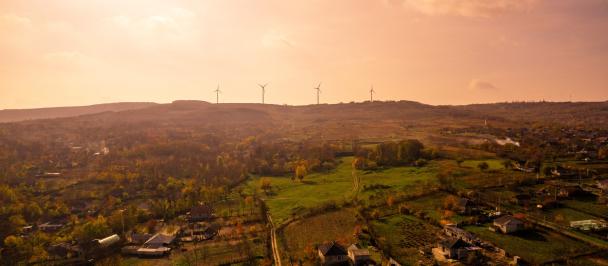Prespa is home to a wide range of biodiversity. Photo: Ljubo Stefanov
At over five million years old, Lake Prespa is amongst the most ancient freshwater lakes in the world.
The beautiful but environmentally vulnerable region of the Prespa Lake Basin is home to more than 2,000 species of fish, birds, mammals and plants. Many of these species are unique and many are in danger of dying out if their habitat is not protected.
This eco-system has suffered greatly over the last 40 years — above all from pollution caused by unsustainable farming practices, together with erosion and the presence of untreated waste and wastewaters.
In the past, farmers just weren’t aware of the dangers of dumping biodegradable waste and over-using fertilizers and pesticides. They dumped thousands of tons of apples in the lake without knowing it would cause serious environmental damage.
The farmer Stevo Radevski explains:
"Over the years, we have been farming the wrong way. Now we all know and understand these practices have negative consequences for the environment and for all of us who live here. We can and must do better. It’s our livelihood. It’s our heritage. It’s our lives."

Apple farming is the main agriculture activity in Prespa. Photo: Ljubo Stefanov
Agriculture accounts for 70 percent of the population's activity in the Prespa region. Any sustainable approach to restoring the health of the eco-system must address the needs of these farmers to maintain production while at the same time supporting them to change their farming practices to protect the environment.
"Our joint efforts have led to hundreds of men and women farmers being trained in sustainable agricultural practices. This has led to a remarkable 30 percent reduction in the amount of pesticides used by local farmers. The first-ever local system for monitoring pests and diseases has been established, further helping farmers to use chemicals more efficiently in lower quantities. And we’ve just helped complete the first-ever composting station — a station that will turn waste into products that can help farmers produce healthier and cheaper fruits," says UNDP Resident Representative Louisa Vinton.
This project financed by the Swiss Development Cooperation includes a comprehensive set of measures to bring the eco-system back to health.
The Restoration of Lake Prespa project is developed and implemented by UNDP in partnership with the Municipality or Resen and the Ministry of Environment.
"It’s great to see so many changes happening for the better. UNDP has been actively supporting this region since 2004 and all our work together is now showing substantial results. This latest project has struck a balance between the needs of the local people and the needs of the environment," says the Mayor of Resen, Gjoko Strezovski.
Farmers like Stevco are all much more aware of the importance of farming responsibly. Many of them have had training in new methods of sustainable farming.
Strong incentives have been given to farmers to reduce the amount of pesticides and fertilizers they use.

Farmers in Prespa reduced the use of pesticides by 30 percent each season since 2005. Photo: Ljubo Stefanov
Stevco uses Facebook and a neat mobile app just recently produced by UNDP to know when best to spray against pests. This application gives farmers instant access to information about the movements of pests and the best actions to take. This innovative approach to farming saves Stevco money and time, and helps him use sustainable farming practices.
Experts are now confident that Prespa is on the right track to recovery. Thanks to long-term cooperation and generous investment, there is room for hope that the eco-system of Lake Prespa will eventually return to health, securing a future for thousands of rare species and a higher standard of living for local people.

 Locations
Locations






